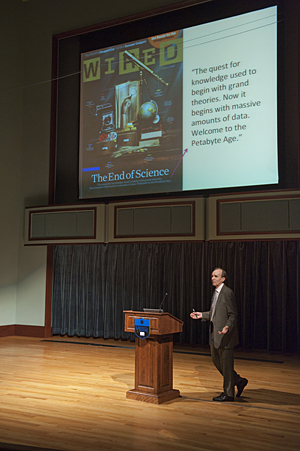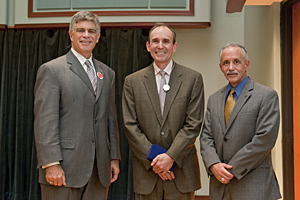
ADVERTISEMENT
- Rozovsky wins prestigious NSF Early Career Award
- UD students meet alumni, experience 'closing bell' at NYSE
- Newark Police seek assistance in identifying suspects in robbery
- Rivlin says bipartisan budget action, stronger budget rules key to reversing debt
- Stink bugs shouldn't pose problem until late summer
- Gao to honor Placido Domingo in Washington performance
- Adopt-A-Highway project keeps Lewes road clean
- WVUD's Radiothon fundraiser runs April 1-10
- W.D. Snodgrass Symposium to honor Pulitzer winner
- New guide helps cancer patients manage symptoms
- UD in the News, March 25, 2011
- For the Record, March 25, 2011
- Public opinion expert discusses world views of U.S. in Global Agenda series
- Congressional delegation, dean laud Center for Community Research and Service program
- Center for Political Communication sets symposium on politics, entertainment
- Students work to raise funds, awareness of domestic violence
- Equestrian team wins regional championship in Western riding
- Markell, Harker stress importance of agriculture to Delaware's economy
- Carol A. Ammon MBA Case Competition winners announced
- Prof presents blood-clotting studies at Gordon Research Conference
- Sexual Assault Awareness Month events, programs announced
- Stay connected with Sea Grant, CEOE e-newsletter
- A message to UD regarding the tragedy in Japan
- More News >>
- March 31-May 14: REP stages Neil Simon's 'The Good Doctor'
- April 2: Newark plans annual 'wine and dine'
- April 5: Expert perspective on U.S. health care
- April 5: Comedian Ace Guillen to visit Scrounge
- April 6, May 4: School of Nursing sponsors research lecture series
- April 6-May 4: Confucius Institute presents Chinese Film Series on Wednesdays
- April 6: IPCC's Pachauri to discuss sustainable development in DENIN Dialogue Series
- April 7: 'WVUDstock' radiothon concert announced
- April 8: English Language Institute presents 'Arts in Translation'
- April 9: Green and Healthy Living Expo planned at The Bob
- April 9: Center for Political Communication to host Onion editor
- April 10: Alumni Easter Egg-stravaganza planned
- April 11: CDS session to focus on visual assistive technologies
- April 12: T.J. Stiles to speak at UDLA annual dinner
- April 15, 16: Annual UD push lawnmower tune-up scheduled
- April 15, 16: Master Players series presents iMusic 4, China Magpie
- April 15, 16: Delaware Symphony, UD chorus to perform Mahler work
- April 18: Former NFL Coach Bill Cowher featured in UD Speaks
- April 21-24: Sesame Street Live brings Elmo and friends to The Bob
- April 30: Save the date for Ag Day 2011 at UD
- April 30: Symposium to consider 'Frontiers at the Chemistry-Biology Interface'
- April 30-May 1: Relay for Life set at Delaware Field House
- May 4: Delaware Membrane Protein Symposium announced
- May 5: Northwestern University's Leon Keer to deliver Kerr lecture
- May 7: Women's volleyball team to host second annual Spring Fling
- Through May 3: SPPA announces speakers for 10th annual lecture series
- Through May 4: Global Agenda sees U.S. through others' eyes; World Bank president to speak
- Through May 4: 'Research on Race, Ethnicity, Culture' topic of series
- Through May 9: Black American Studies announces lecture series
- Through May 11: 'Challenges in Jewish Culture' lecture series announced
- Through May 11: Area Studies research featured in speaker series
- Through June 5: 'Andy Warhol: Behind the Camera' on view in Old College Gallery
- Through July 15: 'Bodyscapes' on view at Mechanical Hall Gallery
- More What's Happening >>
- UD calendar >>
- Middle States evaluation team on campus April 5
- Phipps named HR Liaison of the Quarter
- Senior wins iPad for participating in assessment study
- April 19: Procurement Services schedules information sessions
- UD Bookstore announces spring break hours
- HealthyU Wellness Program encourages employees to 'Step into Spring'
- April 8-29: Faculty roundtable series considers student engagement
- GRE is changing; learn more at April 15 info session
- April 30: UD Evening with Blue Rocks set for employees
- Morris Library to be open 24/7 during final exams
- More Campus FYI >>
12:06 p.m., Nov. 23, 2010----As a microbial ecologist, University of Delaware Prof. David Kirchman used to have the luxury of being left alone to do his work with no one bothering him.
Not any more.
With alarming increases in carbon in the Earth's atmosphere, scientists and policy makers across the globe are interested in his knowledge about the role of microbes in the carbon cycle and other bio-geochemical processes of the oceans.
Kirchman, the Maxwell P. and Mildred H. Harrington Professor of Marine Studies, shared some research highlights from his 25-year career at UD during his Francis Alison Inaugural Lecture, “A Journey Into our Unseen World: Marine Microbes and Global Cycles,” on Wednesday, Nov. 17, at the Roselle Center for the Arts.
Kirchman delivered the lecture as the most recent recipient of the University's Francis Alison Award.
“The Alison Award is the University's highest faculty honor, given annually to the faculty member whose scholarship and teaching set him or her apart,” said Provost Tom Apple in his introduction of Kirchman.
Apple then cited a number of reasons for Kirchman's selection as the 2010 Alison scholar, including his development of the method used to measure the rate of bacterial growth in the ocean and the impact of his research on the scientific community's thinking about carbon flow in climate-change models.
Kirchman has conducted research in all of the world's oceans, and his colleagues have referred to him as “the preeminent marine microbial ecologist in the world today” and credited him with “defining the governing paradigms in the field and setting the research agenda.”
In his lecture Kirchman expressed concern that bacterial growth is increasing in polar waters and becoming more similar to the rates measured in oceans at lower latitudes.
“But it's not enough just to know the rates,” Kirchman said. “We want to identify the bacteria so that we can better understand their role.” To this end, he and his colleagues are using the latest technologies to look at the genetic makeup of microbial colonies.
Why study the oceans? Because they make up more than 70 percent of the Earth's surface.
“We live on a blue planet,” Kirchman said. “If we want to talk about carbon, we have to talk about the oceans.”
Kirchman also pointed out that global warming isn't really global. “Some areas, like the poles, are heating up,” he said, “while others are cooling off.”
“Will we see an ice-free Arctic in the summer by 2020?” Kirchman asked. “I don't know, but that would have widespread implications not only ecologically but also geopolitically and economically.”
Whatever the outcome, Kirchman continues to be fascinated by the diversity and complexity of the world's oceans.
He closed his lecture by quoting Edward O. Wilson, Harvard University professor and winner of two Pulitzer Prizes, whose biological specialty is the study of ants.
In his autobiography, Naturalist, Wilson wrote, “The key to taking the measure of biodiversity lies in a downward adjustment of scale. The smaller the organism, the broader the frontier and the deeper the unmapped terrain.”
Wilson went on to say that if he could do it all over again and relive his vision in the 21st century, he would be a microbial ecologist.
Kirchman said he is glad that he made that choice.
After the lecture, UD President Patrick Harker awarded Kirchman the Alison Medal and cited a testimonial from one of the Alison Scholar's former students, who wrote, “In the field of microbial ecology, Prof. Kirchman is the equivalent of a rock star.”
“It doesn't get any better than that,” Harker said.
Article by Diane Kukich
Photo by Evan Krape



